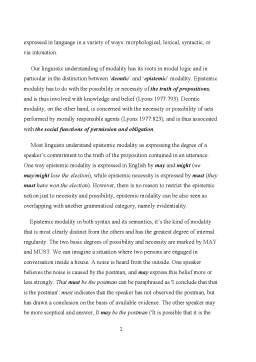Extras din referat
Language is not merely used for conveying factual information. A speaker may, in addition, wish to indicate the degree of certainty with which she/he makes a statement, or to try to influence other people in various ways: to exercise authority or signal submission to somebody else's authority, to give permission or ask for permission, make people do things or stop them from doing things. The semantic categories underlying all these uses of language (and a few more) are subsumed under the term modality.
Many pages, chapters, even books, have been written about the modal auxiliary verbs in English. What makes it so difficult to account for the use of these words is that their meaning has a both logical and a practical element. We can talk about them in terms of such logical notions as ‘permission’ and ‘necessity’, but we still have to consider ways in which these notions become remoulded by the psychological pressures which influence everyday communication between human beings: factors such as condescension, politeness, tact and irony.
In language, modality is the subject concerning modal auxiliary verbs like can, must, and should, that are customarily used to modify the meaning of other verbs (which in turn tend to take an infinitive form). Modal verbs express possibility (and impossibility, necessity, contingency, etc.), permissibility (and obligation, proscription, etc.), probability (and improbability, etc.). Modality is the semantic domain pertaining to elements of meaning that language expresses. Modality is expressed in language in a variety of ways: morphological, lexical, syntactic, or via intonation.
Our linguistic understanding of modality has its roots in modal logic and in particular in the distinction between ‘deontic’ and ‘epistemic’ modality. Epistemic modality has to do with the possibility or necessity of the truth of propositions, and is thus involved with knowledge and belief (Lyons 1977:793). Deontic modality, on the other hand, is concerned with the necessity or possibility of acts performed by morally responsible agents (Lyons 1977:823), and is thus associated with the social functions of permission and obligation.
Most linguists understand epistemic modality as expressing the degree of a speaker’s commitment to the truth of the proposition contained in an utterance. One way epistemic modality is expressed in English by may and might (we may/might lose the election), while epistemic necessity is expressed by must (they must have won the election). However, there is no reason to restrict the epistemic notion just to necessity and possibility, epistemic modality can be also seen as overlapping with another grammatical category, namely evidentiality.
Preview document
Conținut arhivă zip
- Epistemic Modality.doc






